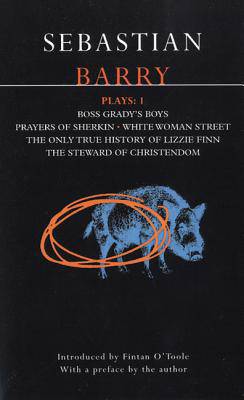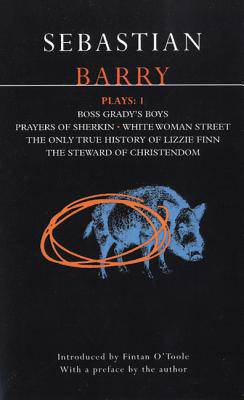
Wil je zeker zijn dat je cadeautjes op tijd onder de kerstboom liggen? Onze winkels ontvangen jou met open armen. Nu met extra openingsuren op zondag!
- Afhalen na 1 uur in een winkel met voorraad
- Gratis thuislevering in België vanaf € 30
- Ruim aanbod met 7 miljoen producten
Wil je zeker zijn dat je cadeautjes op tijd onder de kerstboom liggen? Onze winkels ontvangen jou met open armen. Nu met extra openingsuren op zondag!
- Afhalen na 1 uur in een winkel met voorraad
- Gratis thuislevering in België vanaf € 30
- Ruim aanbod met 7 miljoen producten
Zoeken
Barry Plays: 1
Boss Grady's Boys; Prayers of Sherikin; White Woman Street; Steward of Christendom
Sebastian Barry
€ 51,95
+ 103 punten
Omschrijving
"Cerebral and lyrical, he is the new crown prince of Ireland's majestic theatrical tradition" (Newsweek)
In Boss Grady's boys, Mick and Josey are two old fellas employed on a hill-farm on the Cork-Kerry border, still dreaming of the Wild West and freedom; Prayers of Sherkin, set in the 1890s, captures a moment of change at which ideology and doctrine are discarded for the sake of survival "The play is like a gentle requiem for a dead community" (Irish Times); White Woman Street is about Irish emigration to the South of America "Weaving together a Western...and a very Irish drama of exile" (Independent). The Only True History of Lizzie Finn, is based on the life of the author's own grandmother and in it "Barry uses Lizzie's dilemma to explore the economic decay of the 1890s landowning class and the whaleboned snobberies of rural Ireland" (Guardian). In The Steward of Christendom, Thomas Dunne, an ex-chief superintendent of the Dublin Metropolitan police looks back on his career built during the latter years of Queen Victoria's empire, from his home in Baltinglass in Dublin in 1932."Sebastian Barry's plays are about history, but not in any very obvious or familiar sense...The history that informs these plays is a history of counter-currents, of lost strands, of untold stories. Against the simple narrative of Irish history as a long tale of colonisation and resistance, Barry releases more complex stories of people who are, in one way or another, a disgrace to that history...In Sebastian Barry's luminous plays, grace and disgrace are not opposites but constant companions." (Fintan O'Toole)
Specificaties
Betrokkenen
- Auteur(s):
- Uitgeverij:
Inhoud
- Aantal bladzijden:
- 320
- Taal:
- Engels
- Reeks:
Eigenschappen
- Productcode (EAN):
- 9780413711205
- Verschijningsdatum:
- 12/05/1997
- Uitvoering:
- Paperback
- Formaat:
- Trade paperback (VS)
- Afmetingen:
- 128 mm x 204 mm
- Gewicht:
- 367 g

Alleen bij Standaard Boekhandel
+ 103 punten op je klantenkaart van Standaard Boekhandel
Beoordelingen
We publiceren alleen reviews die voldoen aan de voorwaarden voor reviews. Bekijk onze voorwaarden voor reviews.











